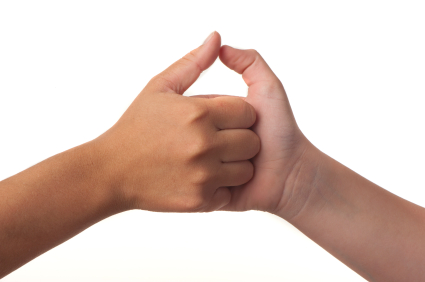Text
“One, two, three, four,
I declare a thumb war.
Five, six, seven, eight,
I use this hand to masturbate.”
The joke is performed in the context of a traditional “thumb war,” in which two opponents hold hands and attempt to press down the other person’s thumb.
Context
AD is a college student from New Jersey. He first heard this joke in middle school, around sixth or seventh grade. “It was right in the beginning of puberty,” he explained. “So nobody really knew what was going on.”
Thumb war tournaments at recess and lunchtime were already a big thing at AD’s school, and there was one boy who would perform the joke. “He was always the kid that would say that kind of stuff… Everybody was scared to say that word, but he would say it,” AD explained. “Everybody would get around him and wait for him to get somebody new. We would go up to the younger kids and do it, too.”
“If you didn’t know, you would freak out the first time you heard it.” The trick is that you are holding hands when the ‘punchline’ drops. “That’s the fun part,” AD said.
AD noted that the joke was exclusively performed among boys.
“It’s stupid now, but back then it was the funniest thing.”
Analysis
AD’s joke stood out to me largely because I had never heard of it before. Another male-identifying friend of mine from California had an experience almost identical to that of AD, even from across the country. As someone who has been socially conditioned as a woman, it made me curious about the differences between boys’ and girls’ experience of the social construction of their sexuality.
It is not surprising that such a joke was popular as AD and his peers entered puberty. Jokes have a normalizing function, providing a safe space for pubescent boys to explore their sexuality.
However, the boys’ self-policing contained the joke within their gender, and I am unaware of an equivalent masturbation joke for girls at this age. I see this discrepancy as deeply reflective of the differences in the social construction of boys’ and girls’ sexuality during puberty. Masturbation is an action — an act of agency over one’s body and sexuality. That the normalization of this action is denied to girls of the same age thus denies them a form of agency over their sexuality.
In a larger context, the deficit of sexual jokes of any nature among pubescent girls may contribute to a lack of knowledge about their sexuality, and feelings of shame due to missing out on the normalizing function of such jokes. This can lead to misinformation or shame about sex and sexual development, rendering teenage girls vulnerable to sexual abuse.
I would argue that folklore in the form of sexual jokes can function as a form of sex education and that pubescent girls may benefit from sharing this folklore amongst each other — especially with relatively harmful jokes, such as this one. (Note how AD now finds the joke “stupid.”)
Lastly I would comment on the adult policing of pubescent sexuality. It really stood out to me that only one boy was bold enough to say the word ‘masturbation’ in a public context, under the potential surveillance of teachers. Such jokes are seen as taboo and ‘dirty’ even as they can have a positive function. I am curious how the awareness of adult policing of sexuality at this age may contribute to shame surrounding sexuality for both boys and girls equally.

